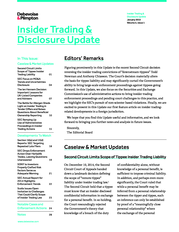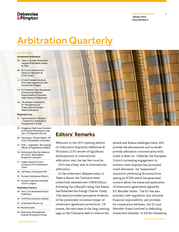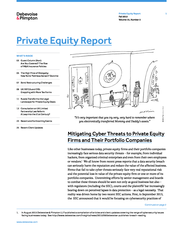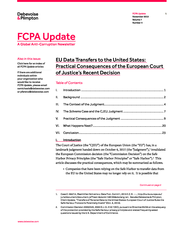Paris Climate Change Accord: 195 Countries Agree to Limit Greenhouse Gas Emissions - December 23, 2015
Debevoise & Plimpton
Description
Client Update
December 23, 2015
consent of two-thirds of the Senate would be required for the United States to
become a party to the agreement. The extent of the obligations imposed by the
NDCs – particularly the obligation for continued progress on previously issued
NDCs – is one major factor in determining whether the Paris Agreement falls
under Article II. Whether the U.S. Senate would approve the Paris Agreement
remains an open question, almost certainly to be determined by the 2016
election.
IMPACT
The Paris Agreement marks the first genuinely global commitment to emissions
reduction in more than 20 years.
It represents a single and flexible approach by both developed and developing countries to reduce dependence on fossil fuels. Implementation of the agreement will require significant reductions in the use of fossil fuels in favor of renewable energy. Individual countries will have to choose their own strategies for energy production and consumption – a choice that will affect both domestic and global corporate behavior. While the rest of the world, including India and China, has demonstrated a commitment to the Paris Agreement (with China likely relying on the U.S. NDC to draft its own), it is possible that the U.S.
Senate would not ratify the Paris Agreement. Some Senators have promised to vote against it should it come before the Senate. However, failure to become a party to the Paris Agreement would risk leaving the United States isolated on one of the more important global and technological developments of this generation. MOVING FORWARD The United Nations Climate Summit, which is to be held in Morocco in November 2016, will mark the first opportunity to observe how countries might expand on the Paris Agreement’s provisions.
Those following developments on climate change will also be eager to see the first national emissions cutting plans when they are released in 2020. We will continue to monitor developments with respect to the Paris Agreement and other initiatives to reduce GHG emissions in the United States. The Paris Agreement may be found at http://unfccc.int/resource/docs/2015/cop21/eng/l09.pdf. *** Please do not hesitate to contact us with any questions. www.debevoise.com 3 .
It represents a single and flexible approach by both developed and developing countries to reduce dependence on fossil fuels. Implementation of the agreement will require significant reductions in the use of fossil fuels in favor of renewable energy. Individual countries will have to choose their own strategies for energy production and consumption – a choice that will affect both domestic and global corporate behavior. While the rest of the world, including India and China, has demonstrated a commitment to the Paris Agreement (with China likely relying on the U.S. NDC to draft its own), it is possible that the U.S.
Senate would not ratify the Paris Agreement. Some Senators have promised to vote against it should it come before the Senate. However, failure to become a party to the Paris Agreement would risk leaving the United States isolated on one of the more important global and technological developments of this generation. MOVING FORWARD The United Nations Climate Summit, which is to be held in Morocco in November 2016, will mark the first opportunity to observe how countries might expand on the Paris Agreement’s provisions.
Those following developments on climate change will also be eager to see the first national emissions cutting plans when they are released in 2020. We will continue to monitor developments with respect to the Paris Agreement and other initiatives to reduce GHG emissions in the United States. The Paris Agreement may be found at http://unfccc.int/resource/docs/2015/cop21/eng/l09.pdf. *** Please do not hesitate to contact us with any questions. www.debevoise.com 3 .













